Provinces of Iran
| Provinces of Iran استانهای ایران Ostânhâ-ye Irân | |
|---|---|
| |
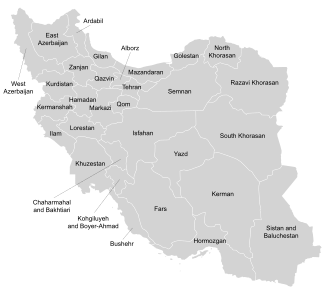 | |
| Category | Unitary state |
| Location | Iran |
| Number | 31 |
| Populations | 591,000 (Ilam province) – 13,323,000 (Tehran province) |
| Areas | 5,833 km2 (2,252 sq mi) (Alborz province) – 183,285 km2 (70,767 sq mi) (Kerman province) |
| Government |
|
| Subdivisions | |
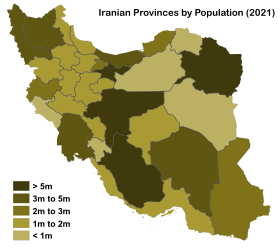
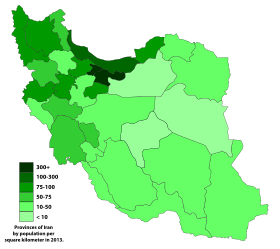

Legend:


Iran is subdivided into thirty-one provinces (Persian: استان ostân), each governed from a local centre, usually the largest local city, which is called the capital (Persian: مرکز, markaz) of that province. The provincial authority is headed by a governor-general (Persian: استاندار ostândâr), who is appointed by the Minister of the Interior subject to approval of the cabinet.
Modern history
[edit]
Iran has held its modern territory since the Treaty of Paris in 1857. Prior to 1937, Iran had maintained its feudal administrative divisional structure, dating back to the time the modern state was centralized by the Safavid dynasty in the 16th century. Although the boundaries, roles, and rulers changed often. On the eve of the Persian Constitutional Revolution in 1905, Iran was composed of Tehran, being directly ruled by the monarch; four eyalats (Persian: ایالات elâyât pl., ایالت elayat sin.), ruled by Qajar princes; and various velayats (Persian: ولایات velâyât pl., ولایت velayat sin.). Nomadic tribal confederations, such as the Bakhtiari people and Qashqai people, were largely independent of the domestic administrative divisions and were autonomous.
With the Constitutional Revolution, and the formation of the first National Consultative Assembly, Iran's administrative subdivisions were legally defined in 1907.[1] Any change in the boundaries of eyalats, velayats, or their respective sub-districts was banned as per the Iranian constitution, except with the passage of a new law by the assembly. As per the 1907 law, the following were defined:[1]
ماده ۲ ــ ایالت قسمتی از مملکت است که دارای حکومت مرکزی و ولایات حاکمنشین جزء است و فعلاً منحصر به چهار ایالت است: آذربایجان، کرمان و بلوچستان، فارس، خراسان
ماده ۳ ــ ولایات قسمتی از مملکت است که دارای یک شهر حاکمنشین و توابع باشد اعم از اینکه حکومت آن تابع پایتخت یا تابع مرکز ایالتی باشدArticle 2 - Eyalat is a part of the kingdom which includes a central government and subordinate governor-ruled Velayats and at the moment there only are four Eyalat: Azerbaijan, Kerman and Baluchistan, Fars, Khurasan.
Article 3 - Velayat is a part of the kingdom which includes a governor-residence city and subordinate areas, whether its governance is subordinate to the capital [Tehran], or to the capital of an Eyalat.On October 22, 1911, Iranian National Consultative Assembly passed another law, titled "The law of Election of National Consultative Assembly" (Persian: قانون انتخابات مجلس شورای ملی). This law presented a complete list of all Eyalats and Velayats of the country, as well as their constituent districts and cities. This list presented the grouping of various towns and districts into electoral districts for the purpose of the election. According to this law, in 1911, Iran was made up of 27 administrative subdivisions, the region of Tehran, 4 eyalats, and 22 velayats.[2] Below is a list:
|
|
In 1937, Iran was reorganized to form ten numbered provinces with subordinate governorates: Gilan, Mazandaran, East Azerbaijan, West Azerbaijan, Kermanshah, Khuzestan, Fars, Kerman, Khorasan, and Isfahan.[3]
Iran has had a historical claim to Bahrain as its 14th province: Bahrain province, which was under British colonial occupation until 1971. Prior to 1957, Bahrain was placed under Fars province.[4] During Safavid Iran, Bahrain was subordinate to Bushehr governorship and Zubarah (located in modern-day country of Qatar) was its capital city. In 1737, under Afsharid dynasty Bahrain was made subject to Fars governorship.[5] This claim was reasserted by the new theocratic Iranian leadership after 1979 with the famous 1981 coup attempt that occurred.[6]
From 1960 to 1981, the governorates were gradually raised to provincial status one by one. Since then several new provinces have been created, most recently in 2010 when the new Alborz province was split from Tehran province, and before that in 2004 when the province of Khorasan was divided into three provinces.[7]
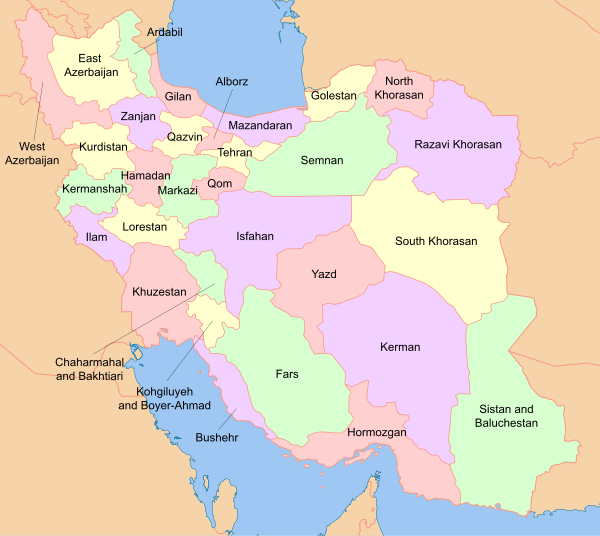
Information
[edit]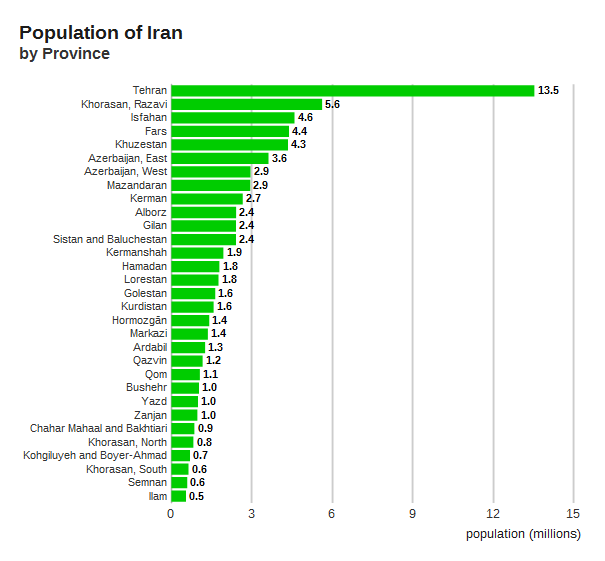
Current provinces
[edit]According to Donya-e-Eqtesad, between 2017 and 2019, some 11 of the 20 poorest Iranian cities were in the province of Sistan and Baluchestan. Three other markedly poor cities were located in Kerman province.[8]
| Province | Abbreviation | Capital | Population (2023)[9] | Area (km2) | Population density (/km2) | Counties | Notes | Map |
|---|---|---|---|---|---|---|---|---|
| Alborz | AL | Karaj | 2,730,000 | 5,833 | 465.01 | 7 | Until 23 June 2010, it was part of Tehran province.[10] | 
|
| Ardabil | AR | Ardabil | 1,284,000 | 17,800 | 71.37 | 12 | Until 1993, it was part of East Azerbaijan province.[11] | 
|
| Bushehr | BU | Bushehr | 1,174,000 | 22,743 | 51.15 | 10 | Originally part of Fars province. Until 1977, it was known as Khalij-e Fars (Persian Gulf).[3] | 
|
| Chaharmahal and Bakhtiari | CB | Shahr-e Kord | 973,000 | 16,332 | 58.03 | 12 | Until 1973, it was part of Isfahan province.[12] | 
|
| East Azerbaijan | EA | Tabriz | 3,925,000 | 45,650 | 85.64 | 23 | 
| |
| Fars | FA | Shiraz | 4,904,000 | 122,608 | 39.57 | 37 | 
| |
| Gilan | GN | Rasht | 2,546,000 | 14,042 | 180.22 | 17 | 
| |
| Golestan | GO | Gorgan | 1,893,000 | 20,195 | 92.53 | 14 | On 31 May 1997, the counties of Aliabad, Gonbad-e Kavus, Gorgan, Kordkuy, Minudasht, and Torkaman were separated from Mazandaran province to form Golestan province. Gorgan was known as Esteraba or Astarabad until 1937.[3] | 
|
| Hamadan | HA | Hamadan | 1,756,000 | 19,368 | 90.78 | 10 | Originally part of Kermanshah province.[3] | 
|
| Hormozgan | HO | Bandar Abbas | 1,806,000 | 70,669 | 25.14 | 13 | Originally part of Kerman province.[3] Until 1977, the province was known as Banader va Jazayer-e Bahr-e Oman (Ports and Islands of the Sea of Oman).[3] | 
|
| Ilam | IL | Ilam | 591,000 | 20,133 | 28.82 | 12 | Originally part of Kermanshah province.[3] | 
|
| Isfahan | IS | Isfahan | 5,136,000 | 107,029 | 47.85 | 28 | In 1986, some parts of Markazi province were transferred to Isfahan, Semnan, and Zanjan provinces.[3] | 
|
| Kerman | KN | Kerman | 3,184,000 | 183,285 | 17.27 | 25 | 
| |
| Kermanshah | KE | Kermanshah | 2,003,000 | 24,998 | 78.10 | 14 | Between 1950 and 1979, both Kermanshah province and city were known as Kermanshahan, and between 1979 and 1995 as Bakhtaran.[3] | 
|
| Khuzestan | KH | Ahvaz | 4,725,000 | 64,055 | 73.54 | 30 | 
| |
| Kohgiluyeh and Boyer-Ahmad | KB | Yasuj | 728,000 | 15,504 | 45.99 | 9 | Originally part of Khuzestan province. Until 1990, the province was known as Bovir Ahmadi and Kohkiluyeh.[3] | 
|
| Kurdistan | KU | Sanandaj | 1,614,000 | 29,137 | 55.02 | 10 | Originally part of Gilan province.[3] | 
|
| Lorestan | LO | Khorramabad | 1,784,000 | 28,294 | 62.23 | 12 | Originally part of Khuzestan province.[3] | 
|
| Markazi | MA | Arak | 1,436,000 | 29,130 | 49.07 | 12 | Originally part of Mazandaran province.[3] In 1986, some parts of Markazi province were transferred to Isfahan, Semnan, and Zanjan provinces.[3] | 
|
| Mazandaran | MN | Sari | 3,302,000 | 23,701 | 138.54 | 22 | 
| |
| North Khorasan | NK | Bojnord | 868,000 | 28,434 | 30.35 | 10 | On 29 September 2004, Khorasan province was divided into three provinces: North Khorasan, Razavi Khorasan, and South Khorasan.[7] | 
|
| Qazvin | QA | Qazvin | 1,284,000 | 15,549 | 81.92 | 6 | On 31 December 1996, the counties of Qazvin and Takestan were separated from Zanjan province to form Qazvin province.[3] | 
|
| Qom | QM | Qom | 1,300,000 | 11,526 | 112.12 | 3 | Until 1995, Qom was a county of Tehran province.[3] | 
|
| Razavi Khorasan | RK | Mashhad | 6,444,000 | 118,884 | 54.12 | 34 | On 29 September 2004, Khorasan province was divided into three provinces: North Khorasan, Razavi Khorasan, and South Khorasan.[7] | 
|
| Semnan | SE | Semnan | 715,000 | 97,491 | 7.20 | 8 | Originally part of Mazandaran province.[3] In 1986, some parts of Markazi province were transferred to Isfahan, Semnan, and Zanjan provinces.[3] | 
|
| Sistan and Baluchestan | SB | Zahedan | 2,777,000 | 180,726 | 15.35 | 26 | Until 1986, the province was known as Baluchestan and Sistan.[3] | 
|
| South Khorasan | SK | Birjand | 786,000 | 151,913 | 5.06 | 12 | On 29 September 2004, Khorasan province was divided into three provinces: North Khorasan, Razavi Khorasan, and South Khorasan.[7] | 
|
| Tehran | TE | Tehran | 13,323,000 | 18,814 | 705.20 | 16 | Until 1986, Tehran was part of Markazi province. | 
|
| West Azerbaijan | WA | Urmia | 3,278,000 | 37,437 | 87.22 | 20 | During the Pahlavi dynasty, Urmia was known as Rezaiyeh.[13] | 
|
| Yazd | YA | Yazd | 1,156,000 | 76,469 | 14.89 | 12 | Originally part of Isfahan province.[12] In 1986, part of Kerman province was transferred to Yazd province. In 2002, Tabas County (area: 55,344 km2) was transferred from Khorasan province to Yazd province.[3] | 
|
| Zanjan | ZA | Zanjan | 1,103,000 | 21,773 | 48.57 | 8 | Originally part of Gilan province. In 1986, some parts of Markazi province were transferred to Isfahan, Semnan, and Zanjan provinces.[3] | 
|
| Iran (total) | IR | Tehran | 80,528,000 | 1,628,554 km2 (628,788 sq mi) | 49.078 | 484 | 
|
Provincial abbreviations
[edit]Table below shows the provinces' abbreviation, which can be used in postal addresses and academic affiliations for the sake of simplicity.
| Province | Abbreviation | Method |
|---|---|---|
| Alborz | AL | First two letters |
| Ardabil | AR | First two letters |
| Azerbaijan, East | EA | First two words |
| Azerbaijan, West | WA | First two words |
| Bushehr | BU | First two letters |
| Chaharmahal and Bakhtiari | CB | First two words |
| Fars | FA | First two letters |
| Gilan | GI | First two letters |
| Golestan | GO | First two letters |
| Hamadan | HA | First two letters |
| Hormozgan | HO | First two letters |
| Ilam | IL | First two letters |
| Isfahan | IS | First two letters |
| Kerman | KE | First two letters |
| Kermanshah | KS | First two words |
| Khorasan, North | NK | First two words |
| Khorasan, Razavi | RK | First two words |
| Khorasan, South | SK | First two words |
| Khuzestan | KH | First two letters |
| Kohgiluyeh and Boyer-Ahmad | KB | First two words |
| Kurdistan | KU | First two letters |
| Lorestan | LO | First two letters |
| Markazi | MA | First two letters |
| Mazandaran | MN | First and last letter |
| Qazvin | QA | First two letters |
| Qom | QO | First two letters |
| Semnan | SE | First two letters |
| Sistan and Baluchestan | SB | First two words |
| Tehran | TE | First two letters |
| Yazd | YA | First two letters |
| Zanjan | ZA | First two letters |
Historical provinces
[edit]See also
[edit]- List of current Iran governors-general
- List of Iranian provinces by Human Development Index
- Administrative divisions of Iran
- Geography of Iran
- ISO 3166-2:IR
References and notes
[edit]- ^ a b "The law on the formation of Eyalats and Velayats and the instructions of the governors, Passed on December 18, 1907". Laws and Regulations Portal of Islamic Republic of Iran. Retrieved 8 February 2023.
- ^ "The law of Election of National Consultative Assembly, Passed on October 22, 1911". Laws and Regulations Portal of Islamic Republic of Iran. Retrieved 8 February 2023.
- ^ a b c d e f g h i j k l m n o p q r s t u Gwillim Law, Statoids website. "Provinces of Iran". Archived from the original on 22 October 2016. Retrieved 30 April 2006.
- ^ Ebrahimi, Mansoureh; Rad Goudarzi, Masoumeh; Yusoff, Kamaruzaman (2018), The Dynamics of Iranian Borders: Issues of Contention, Springer, p. 106, ISBN 9783319898360
- ^ Mojtahed-Zadeh, Pirouz (2013). Security and Territoriality in the Persian Gulf: A Maritime Political Geography. Routledge. p. 139. ISBN 978-0700710980.
- ^ "Former IRGC General Close To Supreme Leader Khamenei: 'Bahrain Is A Province Of Iran That Should Be Annexed To [It]'". MEMRI. 23 March 2016. Retrieved 15 March 2022.
- ^ a b c d Online edition, Al-Jazeera Satellite Network. "Iran breaks up largest province". Archived from the original on 20 May 2006. Retrieved 30 April 2006.
- ^ "Iran Enters A New Economic Era Marked By Poverty". Iran International. 23 August 2021. Retrieved 15 March 2022.
- ^ "Census 2023: Population and Households of the Country by Province and Sub-province (Shahrestan)" (Excel). Iran Data Portal. The Statistical Center of Iran. Retrieved 17 December 2022.
- ^ Larijani, Ali (16 April 1389). "Alborz province establishment law". Lamtakam (in Persian). Guardian Council. Archived from the original on 16 December 2023. Retrieved 16 December 2023.
- ^ Chamber Society, Iranian. "Ardabil Province". Archived from the original on 12 June 2008. Retrieved 23 July 2008.
- ^ a b Chaharmahal and Bakhtiari Province, Ostandarie. "Chahar Mahaal and Bakhtiari Province". Retrieved 23 July 2008.[permanent dead link]
- ^ "Urmia". Archived from the original on 8 September 2008. Retrieved 23 July 2008.
External links
[edit] Wikimedia Atlas of Iran
Wikimedia Atlas of Iran- Statistical Centre, Government of Iran
- Iranian Provinces Investment – trade promotion organization of Iran, affiliated to the Ministry of Commerce (Iran)
- "Provinces of Iran". Statoids.
- Official provincial websites
- Ardabil
- East Azarbaijan
- West Azarbaijan
- Bushehr
- Chahar Mahaal and Bakhtiari
- Fars
- Gilan
- Golestan
- Hamadan
- Hormozgan
- Ilam
- Isfahan
- Kerman
- Kermanshah
- North Khorasan
- Razavi Khorasan
- South Khorasan
- Khuzestan
- Kohgiluyeh and Boyer Ahmad
- Kurdistan
- Lorestan
- Markazi
- Mazandaran
- Qazvin
- Qom[permanent dead link]
- Semnan
- Sistan and Baluchestan
- Tehran
- Yazd
- Zanjan


